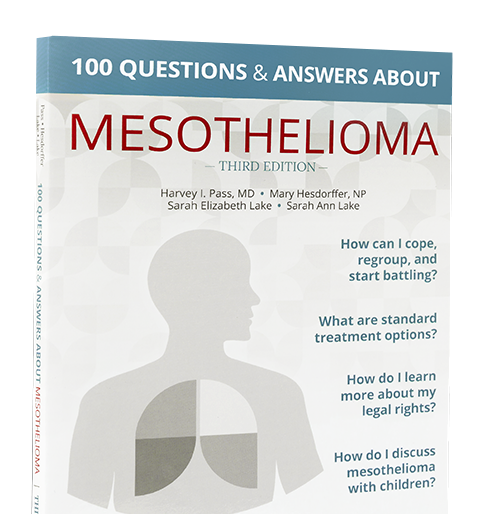You may have questions related to mesothelioma prognosis, life expectancy and survival with a mesothelioma diagnosis. Our team has the real answers you need about mesothelioma to help you during this time. Common questions we are asked everyday include:
What is Life Expectancy with a Mesothelioma Diagnosis?
Mesothelioma specialists use a variety of tests to help diagnose mesothelioma. Diagnostic tests help them obtain a clearer picture of the cancer stage and location of the mesothelioma tumor. Once a mesothelioma diagnosis is confirmed, a mesothelioma specialist will create a treatment plan that is tailored to the patient’s unique needs.
The average mesothelioma life expectancy ranges from 12 to 21 months, but many people may live much longer with the disease. Some patients have doubled or tripled their life expectancies by finding the right doctor for their diagnosis. The best way to increase life expectancy may be to explore treatment options with an experienced specialist.
Life expectancy is a survival statistic for how long someone is estimated to live with mesothelioma, while prognosis may offer explanations on how life may be impacted with and without treatment. Mesothelioma life expectancy and prognosis can change based on the doctor’s treatment plan and how well the patient responds to it.
There is no cure for mesothelioma, although some patients have been able to go into short-term remission. Mesothelioma caught in an early stage has a better prognosis with more treatment options available compared with later stages, leading to a better chance of long-term survival. Additionally, maintaining good overall health can improve prognosis.
What is the Survival Rate for Someone Diagnosed with Mesothelioma?
Survival rates are another way to express the average cancer patient’s survival time with recent statistics. Because mesothelioma is so rare, survival rates for the disease tend to be much lower than other types of cancer. Mesothelioma survival rates may improve with the development of novel therapies; however, the average survival time post a mesothelioma diagnosis is 12 to 21 months.
Mesothelioma life expectancy and survival rate are influenced by a variety of factors including the type of mesothelioma, cell types and cancer stage, as well as patient age, gender and overall health. A patient might have a better prognosis and longer life expectancy based on these prognostic factors.
What Factors May Impact my Life Expectancy with a Mesothelioma Diagnosis?
Mesothelioma treatment is getting better every year and patients are living longer as a result. Patients may turn to traditional therapies, like chemotherapy and radiation, as well as clinical trials, which may lead to a cure in the future.

Location
The place where the disease originated is often the first factor in determining a person’s life expectancy.

Cell Type
Mesothelioma cell type has a huge impact on your life expectancy and may determine how fast the disease will spread.

Stage
Mesothelioma cancer stages will be determined by your doctor to assist with treatment planning and life expectancy.
Learn How to Increase Life Expectancy with our Free Mesothelioma Guide
Our mesothelioma advocates are ready to support and find you real answers to all questions related to a mesothelioma diagnosis. We can assist with health information, legal rights to compensation, and provide general resource materials.
If you or a loved has been diagnosed with mesothelioma, we would like to send our exclusive mesothelioma packet of information today.
Get Mesothelioma Help
What are the Locations of the Body primarily Affected by Mesothelioma?
Pleural Mesothelioma
The cancer starts in the lining around the lungs (called the “pleura”). This is the most common type of mesothelioma.

Peritoneal Mesothelioma
The cancer starts in the lining around the stomach. While a rare form of cancer, it accounts for about 20% of mesothelioma diagnosis.

Pericardial Mesothelioma
The cancer starts in the lining around the heart. This type of mesothelioma is very uncommon.

Testicular Mesothelioma
The cancer is found in the serous membrane, or “tunica vaginalis,” surrounding the testes in men. This is the rarest form of mesothelioma.
How do Cell Types Affected Impact Mesothelioma Life Expectancy?
What are the Stages of Mesothelioma in Relation to Prognosis and Life Expectancy?
Understanding the stages of mesothelioma will likely a determining factor prognosis. The stage is only a reflection of the mesothelioma spread/growth by the time it is diagnosed. Some mesothelioma victims do not have significant symptoms at earlier stages or symptoms may be misdiagnosed in the early stages. However, if for some reason mesothelioma is discovered through routine imaging or other surgery, patients may have a better prognosis than those in the advanced mesothelioma stages. Early detection might mean that more mesothelioma treatment options may be available, like surgery, that might not be an option in later stages.
Mesothelioma Stage I Prognosis Patient diagnosis at Stage I may offer the best prognosis since there may be more treatment options for consideration. Mesothelioma life expectancy averages around 21 months, with much longer survivorship possible with some treatment options.
Mesothelioma Stage II Prognosis Diagnosis at this stage of mesothelioma, in which cancer has spread to nearby lymph nodes, the prognosis remains good. It is easier to diagnose mesothelioma at this stage because of larger tumor size and more physical symptoms. The median survival for this stage is around 19 months without treatment.
Mesothelioma Stage III Prognosis The prognosis for Stage III mesothelioma is less positive because cancer has spread throughout the affected region and treatment options may be limited. The median life expectancy at this stage is around 18 months without treatment.
Mesothelioma Stage IV Prognosis Given the spread of cancer to distant organs, the prognosis for Stage IV mesothelioma is poor. The average life expectancy is less than one year. We have hired some of the most experienced investigators. They will figure out where you were exposed.
What is Mesothelioma Life Expectancy without Treatment?
While many mesothelioma treatment options exist, some patients choose not to undergo treatment. It is difficult to predict life expectancy, as each patient and their mesothelioma diagnosis is unique. However, for example, if a patient is suffering from malignant pleural mesothelioma and chooses not to treat, they may have a life expectancy of around six months depending upon what stage of cancer they are placed (they higher the stage typically reduces the estimated life expectancy). As stated, the mesothelioma life expectancy statistics vary significantly based on cancer stage, cell type, location of tumors, and the patient’s overall health. There are many reasons mesothelioma patients may choose not to undergo treatment, but the patient should discuss and understand all treatment options with an experienced doctor before deciding on their care plan.
Are There Ways to Improve my Prognosis?
Prognosis for mesothelioma is shorter than many other types of cancer mainly due to the length of time symptoms of mesothelioma begin to appear and are then diagnosed. But every patient, with support of their medical team, family, and mesothelioma advocates, may be able to improve their prognosis.
Is Compensation Available to Help Those with a Mesothelioma Diagnosis?
The only cause of mesothelioma is exposure to asbestos and the companies that exposed people to asbestos owes compensation for this disease. This compensation is tax-free and will not affect other benefits an individual is receiving. Many companies have set up trust funds to pay victims of mesothelioma. These claims DO NOT require filing a lawsuit or going to court. However, if this compensation is not claimed, the money may go back to the companies responsible for the asbestos exposure.
Additionally, if asbestos exposure occurred with serving in the military, the Veterans Administration (VA) officially recognizes the connection between asbestos exposure and mesothelioma. It considers the disease a service-connected disability and allows veterans to file claims for special benefits and disability compensation related to mesothelioma. Currently, veterans account for about 30 percent of all mesothelioma diagnoses. This disproportionately large share is due to the military’s extensive use of asbestos-containing products, especially aboard Navy vessels. The amount of disability compensation the VA pays out is determined using a “disability scale,” which rates a veteran’s disability from 0 (least disabling) to 100 (most disabling). The VA uses this scale to determine the severity of the service-connected disease and always rates mesothelioma as 100 percent disabling. If a veteran is diagnosed with service-related mesothelioma, they can access compensation by filing a claim with the VA.













